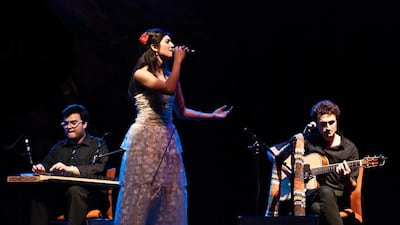If blues is the musical expression of alienation and longing, then it has Greek and Turkish brethren in rebetiko.
Such is the esteem that the genre is often referred to as the Blues of the Aegean.
Like its American counterpart, rebetiko is undergoing a renaissance, with many of its popular tunes – dating back to the 1920s – being revitalised and publicly reintroduced by a new wave of young artists.
Leading the comeback is the London-based Turkish singer Cigdem Aslan.
With her recent debut solo album Mortissa, Aslan delivers a stirring 13-song selection illustrating the power and passion of rebetiko.
“It is the music of others,” she explains from Morocco’s recent Mawazine Festival. “It originated in the suburbs and cafes in Turkey and Greece and it’s made by people who can’t fit into the norms of society or who haven’t been accepted. I won’t say it’s miserable, but the songs tell you stories of people and the sorrows they experienced.”
Upon first listen to Mortissa, it is not easy to designate the exact geographical location of rebetiko. In some tracks you would hear the fluttering of the oud, in others you can hear the vibrant strumming of the bouzouki. Meanwhile, the melodies – often sung in Turkish or Greek – are distinctly oriental and rhythmically backed up by the bendier, a frame drum often used North African songs.
Then there are the lyrics which, when translated, reveal a plethora of characters down on their luck and seeking relief or redemption.
In the mournful To Dervisaki, Aslan takes on the role of "a little dervish" who, after being kicked out of his community, channels his longing by playing oud in a local coffee shop.
A festive vibe surrounds Usakli Kiz (Girl from Usak) with Aslan telling a tale of an Usak bride over a trotting rhythm featuring rippling qanoons and baglama (a long-necked lute).
This album’s blend of Turkish and Greek elements is meant to sound effortless, Aslan says, as rebetiko initially flourished after the Greek and Turkish population exchange of 1923, an event that also saw the transference of musical cultures from both nations.
“It’s a music that to me has no real borders, so I don’t want to call it just simply Turkish or Greek,” she says. “It was there before such borders were created. The music is talking to you and that’s what attracted me to it. I sing in Greek and Turkish and although I don’t know some of the Greek words that I am singing, I know that it makes feel something.”
Mortissa has its roots in Aslan's childhood. Born to a Kurdish Alevi family in Istanbul, she recalls rebetiko songs were often sung at family gatherings as ways to celebrate and preserve the culture.
“Music is very important as we have mostly an oral tradition,” she says. “So I basically grew up with music in my ears and whenever someone came to visit we had someone playing music and we were all singing.”
Aslan’s musical interest followed her to England where she relocated to undertake a university degree in English literature. In her spare time, she lent her singing talent to a variety of world music crews including Dunav (running more than 50 years, the band are arguably England’s longest-running Balkan group) and the Eastern European music collective Shekoyokh Klezmer Ensemble.
After years of exploring other musical cultures, Aslan says Mortissa is a way to showcase her own talent and break a few misconceptions along the way – the biggest being rebetiko is only sung by males.
“It is historically male-dominated, but some of the music coming from Turkey also had women singers as well,” she says. “Not only that, the stories from these songs feature a lot of women characters. What I am trying to do is highlight their existence and give more room for women to express themselves and to say that we are still here.”
With Mortissa establishing Aslan as a burgeoning world music star with a fan base stretching from Europe and North Africa to Australia, she admits her toughest critics remain the crowds back home in Turkey and Greece.
“It was difficult for me because you are performing this music to people who are not familiar with it, but they listen to you with a more open mind, while at home they are more critical,” she says.
“It’s not very easy, but overall I think we are generally doing a good job.”
• Mortissa by Cigdem Aslan is out now. For more information, visit www.cigdemaslan.com. Next week on the Mawazine Sessions: we speak to the Iraqi superstar Kadim Al Sahir


